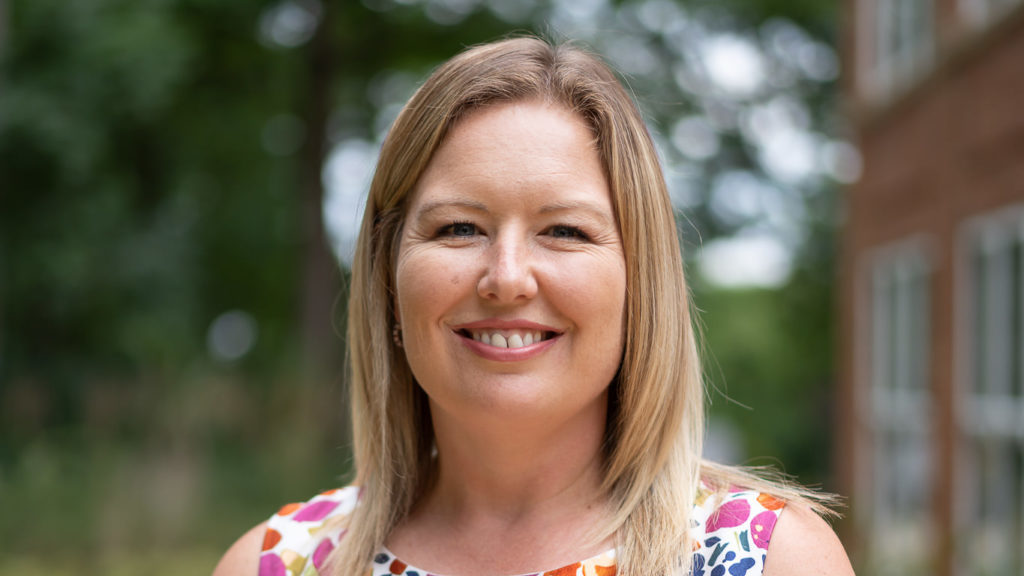Leader’s spotlight: Oakland Care offers a greener care choice

Chief executive Joanne Balmer says all-inclusive fees and a sustainability model are key to helping Oakland Care stand out from crowd in the Southeast luxury care home market.
Balmer started working in care homes as a care assistant at the age of 16. “I always wanted to be a nurse, even when I was a toddler,” Balmer says. “My mum has pictures of me always wearing nurse outfits. I never really wanted to do anything different.”
Having started as a volunteer in care homes and hospitals, Balmer worked in healthcare for 10 years as a qualified nurse before going into social care and focusing on quality improvement in 2010. She then joined Gracewell Healthcare and also later transitioned to work with Sunrise Senior Living as part of its acquisition by HCN, which became known as Welltower.
After spending six years with Sunrise and Gracewell focusing on care quality and operations, Balmer was approached to join Oakland in 2019.
“Sunrise and Gracewell had a fair- sized portfolio of nearly 50 homes throughout England and had a corporate structure because there was also the US part of the company which had an involvement in how the group operated,” Balmer explains.
“What I was really attracted to at Oakland was the ability to come into an organisation which at the time was very small with only three open homes when I joined. I was able to really influence and drive growth and also to be able to foster innovation within a small business because we were able to make decisions a lot quicker and we were able to be quite agile and well connected to our people.
“I have got to know, as you would expect, all our home managers, deputies and the heads of departments as well as quite a lot of our carers.
“There comes a point when you have a certain size portfolio that you lose that personal touch. Oakland gave me a real opportunity to have that, but still have a real quality focus while also realising that ability to grow and innovate within social care.”
Since Balmer joined, Oakland has grown to eight operational care homes providing residential, dementia, nursing and respite care in Essex, Kent, East Sussex and Oxfordshire with five having opening in the last three years.
A further two homes are mid- construction, with Oakland having a pipeline of a further three identified sites.
“That will complete our short- term growth plans under our current ownership,” Balmer says. “As long as you have a good structure to really manage the business, it really is a case of making sure you remain in touch with the people which is fundamentally important for success.”
Having worked her way up the career leader from care assistant to chief executive, Balmer is a shining example of how care can offer a career pathway.
“That’s definitely something that we focus on quite a lot in Oakland,” Balmer says.
“We have a talent management strategy and we are constantly appraising where our people are in terms of their performance and where their opportunities are, so we can look to build people’s careers with us as we grow the portfolio. We have got people who have been with us for years, who have grown from unit manager roles into managers, carers and deputy managers. We have got a head chef who has now moved into a role where he is head of hospitality and lifestyles. This was someone who was solely a chef and had never dreamt of doing anything with activities. He has now been able to develop into that extended role.”
Oakland has developed homes in geographic clusters to help offer
opportunities for staff to work across three or four homes.
“Having smaller clusters enables people to grow into roles and that allows them to take smaller steps to moving into regional roles,” Balmer explains.
“We always develop in areas where there is a noted undersupply in the market. We also look ahead so that even where you have a geographic location that may have only a very small undersupply, if a lot of the neighbouring stock is quite old and there’s not a supply of high-quality wetroom provision for example, we know that within five or ten years a proportion of that stock will no longer be operating and the local people will still need a good-quality care home to go to, so we do take that into account.”
With the Southeast an increasingly saturated market when it comes to luxury care home provision, we asked Balmer what made Oakland Care different?
“One of the things that really differentiates us is our all-inclusive offering,” she says. “When we quote our weekly fees to prospective residents, they include everything from going to the hairdressers every week, having their chiropody done when they need it, all their activities, their Sky TV, phoneline rental and telephone usage. There’s no additional billing and no extras on top.
“I think that really offers residents peace of mind and it’s more straightforward for bill payers to understand than having the care charge and then lots of itemised bills.”
Resident services are incorporated within weekly average fees which average just under £1,500.
“We have got people who have been with us for years, who have grown from unit manager roles into managers, carers and deputy managers. We have got a head chef who has now moved into a role where he is head of hospitality and lifestyles.”
“We have had good growth in our average weekly fee over the last three years but also, as you would expect, our costs have also increased,” Balmer notes.
“Labour accounts for a minimum of 55% of revenue coming into the business and we need to make sure, like all care businesses, that we have enough staff to provide a really good care offering, otherwise that is really going to have an impact on people’s experience and their quality and our reputation.
“When we are able to achieve greater revenue by average weekly fee growth, we do reinvest that into our team members through our various reward and recognition activities and also primarily through pay rates.”
Balmer highlights sustainability as the second element that made Oakland stand out from the crowd.
“We have put a lot of work in the last few years around sustainability to position Oakland Care as the greener care choice for people because we have found that it really does matter to our people, including those who choose to come to work for us, as well as prospective residents who get really quite involved in our sustainable activities and their relatives who may well be the decision-makers,” she says.
Oakland’s sustainability drive began with an annual staff survey that demonstrated substantial demand for specific initiatives around recycling as well as other simple measures.
“There were quite a lot of people thinking about how we were impacting the environment and what we could do better,” Balmer says. “It’s very much still driven by our team members.”
The care group has formed a sustainability committee which comprises champions from each of its eight care homes.
“They’re the ones that generate ideas, innovation and drive change to the business,” Balmer says.
The chief executive says Oakland’s residents were “extremely engaged” with sustainability activities such as biodiversity gardens and beekeeping.
The business gives back more community projects such as tree planting, litter picking, beech cleaning and town cleans, with Balmer and her regional team also getting involved.
“People who give that time during working hours are obviously funded by Oakland, so that is an investment from us,” Balmer says.
“We have noticed it has had a real impact on our engagement. People are able to really influence what we are doing in our homes if they come up with a good idea. It’s having a real impact for our people and for the wellbeing of residents where they’re getting involved along with their relatives. It’s been a phenomenal success for us over the last few years.”
Balmer says Oakland’s sustainability ethos had helped boost recruitment, especially with the younger generation as well as helping increase occupancy levels.
Group turnover is around 27%, below the sector average of 31%, with agency use less than 5% of labour hours and “reducing rapidly”.
Balmer says the business forecasts agency usage to fall under 2% by the end of December.
Occupancy, meanwhile, is more than 90% at Oakland’s mature homes and is rising well at its growth homes in Swanley and Maidstone which have recently opened.
Looking forward, Balmer says she expects Oakland to be eligible for green finance when it looks to raise capital again to drive future growth.
Despite its innovations in sustainability, Balmer says the group had yet to access green finance.
“When we last raised finance in 2021, there didn’t seem to be a clear or consistent benchmark for what providers needed to achieve in order to be eligible for green finance,” Balmer observes.
“Different lenders seem to have different expectations which isn’t very helpful for the sector. Collaboration between lenders to agree the benchmark for green finance eligibility in social care would be a big step forward for the sector.”
Having become the UK’s first carbon neutral group, Balmer says the next step for the business is to become net zero.
“We have targets we have set out to get there and are in the process of designing our first net zero care home for completion in late 2024/early 2025,” Balmer says.
“Our latest new builds will be gasless and will employ alternative technology for utilities such as ground source heat pumps and solar panels.”
Oakland also BREEAM accredits all its operational homes at a cost of around £10,000 for each site.
“To do BREEAM in construction you have to start that process even
before the scheme goes in for planning and you’re looking at a minimum of £250k in extra construction costs,” Balmer explains.
The chief executive noted many care home operators may not have cash liquidity to invest into being fully sustainable, however, while observing there were smaller things they could still do.
“We have done lots of things to reduce our waste,” Balmer says. “We
have reduced our delivery miles and fed that into our procurement processes, so that when we are tendering for different services we have restrictions on how often they can deliver to the homes.
“We have invested in new technology to vacuum press our clinical waste which means that less goes to landfill and our bin does not get as full as quickly, so the lorry taking it away doesn’t have to come as frequently. It’s a whole knock-on effect in how we do business.
“We now need to ensure we are generating as little carbon as possible in the first place and minimise our footprint for the environment.”
Oakland looks set to reap the benefits of being a first mover as sustainability becomes an increasing priority for carers, residents and their families in the years ahead.



